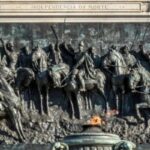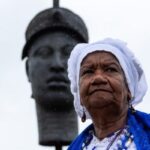We explain what is celebrated on Brazilian Independence Day and the historical events that gave rise to it. Also, when and how the celebrations are.

What is celebrated on Brazilian Independence Day?
On September 7 of each year, Independence Day is celebrated in Brazil that is, the commemoration of the day on which the then regent of the Kingdom of Brazil, Don Pedro de Braganza, later known as Pedro I of Brazil, formally broke the ties that united the Brazilian territory with the Portuguese metropolis. From that day on, Brazil, which had been a colony since the 16th century, began to exist as an autonomous political entity: the Empire of Brazil.
More precisely, we remember what happened on September 7, 1822: the formal declaration of the Brazilian Independence today known as the Grito de Ipiranga which took that name because it occurred on the banks of the Ipiranga River, near San Pablo. There, Regent Pedro of Brazil received notification that the Cortes of Lisbon had declared both his government and the Constituent Assembly that he had convened illegitimate, and also demanded his immediate return to Portugal.
These decisions of the Cortes of Lisbon implied the end of the regency and the recolonization of Brazil, which since 1815 had acquired the status of participating kingdom of the United Kingdom of Portugal, Brazil and the Algarve, by decision of John VI of Portugal. This generated a lot of discontent in Brazil.
Consequently, Don Pedro de Braganza called his aides-de-camp and invited them to take off their blue and white bracelets, which represented Portugal. Then, according to the traditional story, he spoke the following words: “Friends, the Portuguese Cortes want to enslave us and persecute us. As of now, our relations are broken. No tie unites us more.” And, drawing his sword, he shouted: “By my blood, my honor, my God, I swear to give freedom to Brazil. (…) Independence or death!” (Taken from Ótavio Tarquino de Sousa, History of the Founders of the Brazilian Empirevol. 2, t. 2).
With the Cry of Ipiranga, the decisive moment of Brazil's independence struggle began, which culminated two years later, with the expulsion of the last Portuguese troops from American territory. In 1825, the recognition of Brazilian independence by the Portuguese Crown occurred. From then on, The Empire of Brazil was consolidated as a constitutional monarchy ruled by Peter I.
Currently, September 7 is a national holiday in Brazil. That day pays tribute to the independence struggle and seeks to strengthen the national collective memory. There are often military parades, especially in large cities such as Brasilia, the capital city, where acrobatic displays are carried out by the Air Demonstration Squadron of the Brazilian Air Force, popularly known as Esquadrilha da Fumaça.
See also: Independence of Brazil
What were the causes of Brazil's independence?
Brazilian independence responded, in general terms, to the following causes:
- The transfer of regent John VI and the rest of the Portuguese royal family to Brazil in 1808 after the Napoleonic invasion of the Iberian Peninsula, which generated a climate of tension between the colony and the metropolis.
- The granting of kingdom status to Brazil in 1815 by regent John VI (crowned king a year later), before he was summoned to Portugal by the Cortes of Lisbon and left his son, Pedro, as regent of Brazil, possibly with instructions to spearhead any independence attempt.
- The attempt by the Courts of Lisbon to return the colony status to Brazil by deciding the end of the regency and demanding Pedro's transfer to Lisbon. Faced with this, more than 8,000 Brazilians signed a petition in which they asked Pedro to disobey said instruction and remain in Brazil.
- Portugal's political and military weakness after the liberal Porto Revolution broke out in 1820 which was used by the independentists to promote a relatively peaceful liberation.
How long did the Brazilian War of Independence last?
Compared to the violent independence struggles in Latin America, Brazil's War of Independence was quite brief and caused fewer fatalities. It began in 1822, when Pedro I disobeyed the mandate of the Cortes of Lisbon and decided to remain in Brazil, and culminated two years later, with the expulsion of the last Portuguese troops from Brazilian territory.
It is difficult to calculate the losses of each side, but it is estimated that in this war there were no major clashes between the two armies that left many fatalities, as occurred in other cases with battles such as those of Maipú, Carabobo or Ayacucho. On the contrary, in general they were tactical confrontations, sieges and guerrilla wars. By the end of 1823, the independence side had practically achieved victory. The last Portuguese soldiers surrendered in March 1824.
Other important dates in Brazil
Other important dates in Brazilian history are the following:
- November 15. Celebration of the Proclamation Day of the Republic of Brazil in 1889, which was achieved through a coup d'état against the monarchy of Pedro II.
- April 21. Celebration of Tiradentes Day, in honor of the independence fighter Joaquim José da Silva Xavier, who was a dentist by profession and died on that date.
- November 20. Celebration of the National Black Consciousness Day, which commemorates the Afro-Brazilian cultural and historical contribution and the death of Zumbi de los Palmares, a warrior of African origin born in northeastern Brazil.
Continue with: Flag of Brazil
References
- Burns, E.B., and Schneider, R.M. (2024). Independence of Brazil. Encyclopedia Britannica. https://www.britannica.com/
- De Sousa, O. T. (2015). History of the founders of the Brazilian Empire, vol. II: To the life of D. Pedro I. Editions of the Federal Senate.
- Faust, B. (2003). Concise history of Brazil. Economic Culture Fund.
- Ministry of Culture of the Government of Spain. (sf). Independence of Brazil. https://www.cultura.gob.es/
- Pimenta, JP (Ed.). (2021). And it stopped being a colony. A history of Brazilian independence. Flint.





